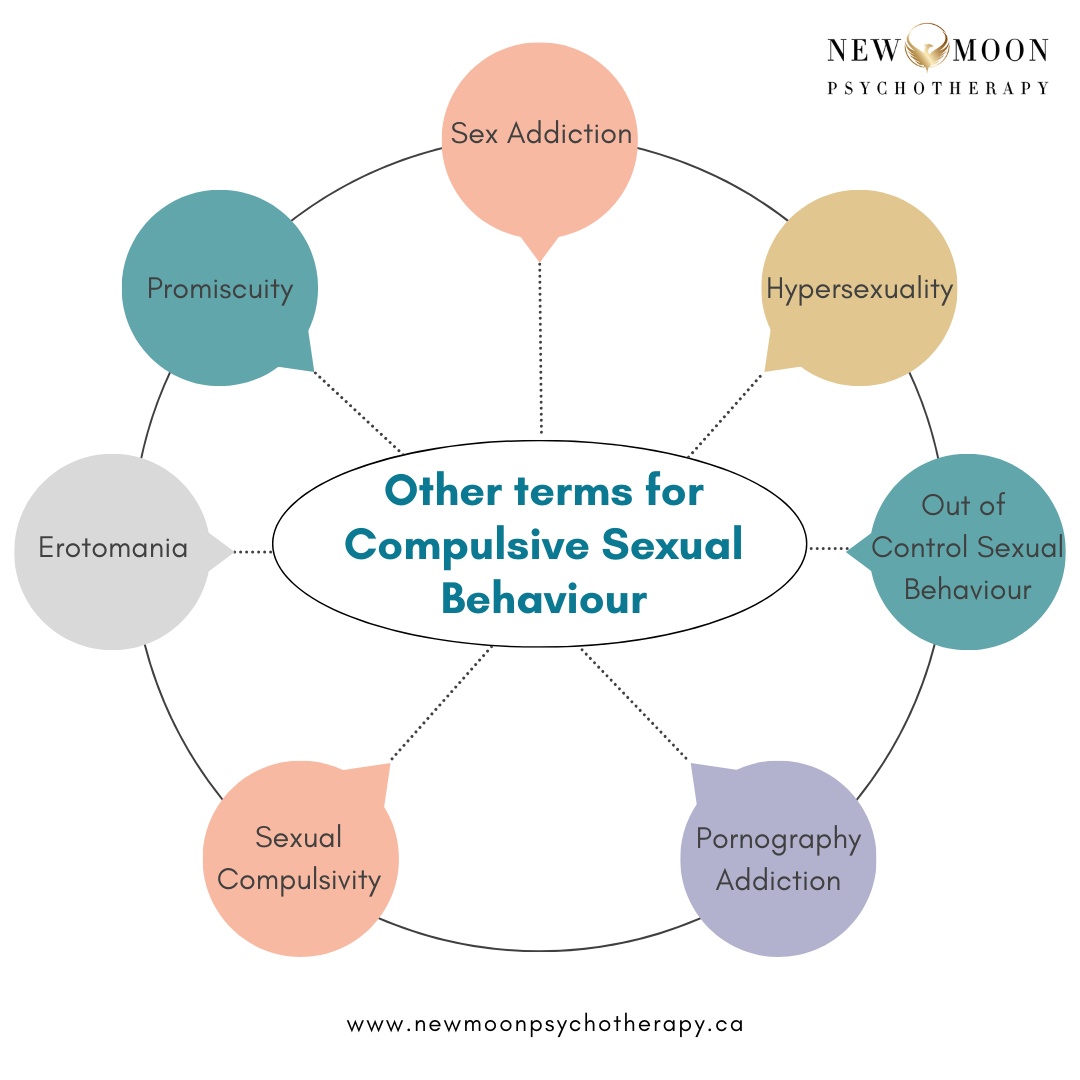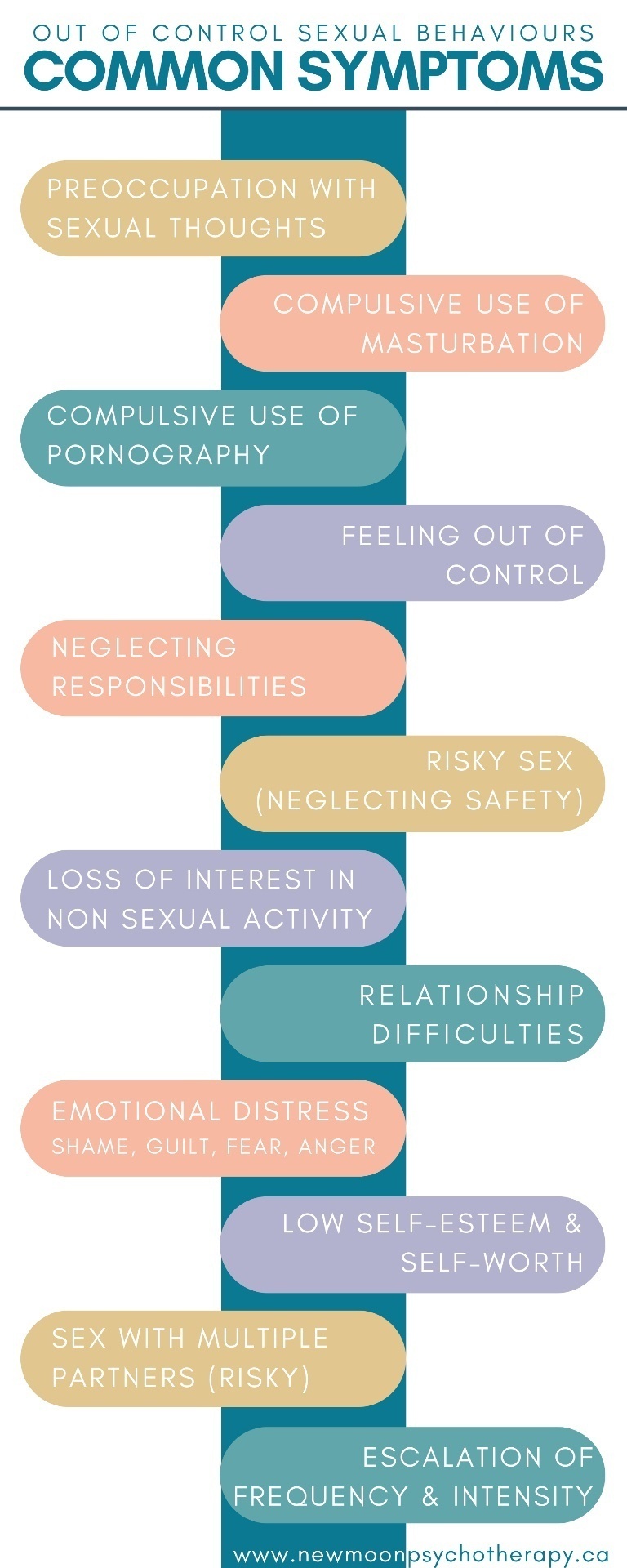What is Sex Addiction or Out of Control Sexual Behaviour?
Out of control sexual behaviour, often referred to as sex addiction, pornography addiction, or hypersexuality, involves a persistent preoccupation with and engagement in sexual activities.
 It’s important to note that the term “sex addiction” is not recognized as a diagnosis in the latest edition of the Diagnostic and Statistical Manual of Mental Disorders. For this reason, we refer to all behaviours associated with the terms “sex addiction” or “pornography addiction” as “out of control sexual behaviours”.
It’s important to note that the term “sex addiction” is not recognized as a diagnosis in the latest edition of the Diagnostic and Statistical Manual of Mental Disorders. For this reason, we refer to all behaviours associated with the terms “sex addiction” or “pornography addiction” as “out of control sexual behaviours”.
Those experiencing out of control sexual behaviour engage in sexual activities to an extent that is distressing to them, interferes with their daily functioning, and negatively impacts various areas of their life.
Like many problematic behavioural patterns, out of control sexual behaviour, often develops in response to underlying emotional or psychological challenges. It is a way of coping and never due to a personal failing.
For individuals struggling with out of control sexual behaviour, sexual thoughts, desires, or actions can become the primary way of managing emotional distress, stress, or feelings of emptiness. These behaviors are often repetitive and driven by a compelling urge that is difficult to resist.
Symptoms of Out of Control Sexual Behaviour
Out of control sexual behaviour varies greatly from person to person and involves a variety of symptoms that interfere with an individuals daily life and well-being. It’s important to note that these symptoms can vary in intensity and duration, and not everyone who exhibits some of these behaviors necessarily has a problem. If you or someone you know is experiencing these symptoms to a degree that it is negatively affecting their life, it is important to connect with a mental health professional with expertise in this area.
 Preoccupation with Sexual Thoughts
Preoccupation with Sexual Thoughts
Intrusive and persistent thoughts about sex or engaging in sexual fantasies, which interfere with daily activities.
Compulsive Use of Masturbation
Masturbation itself is a healthy sexual activity. Masturbation is only considered to be an element of out of control sexual behaviour when it is:
- compulsive
- ritualistic
- excessive
- difficult to stop
- difficult to control
- interferes with daily life
Compulsive Use of Pornography
Preoccupation with sexual content can result in excessive consumption of pornography. Individuals may experience intrusive urges to engage with pornographic material, difficulty stopping or reducing their consumption, and an escalation in the frequency, duration, and content of pornographic materials which they engage with that interferes with daily life and relationships.
Feeling out of Control
Repeatedly engaging in sexual activities despite efforts to stop or reduce them. There is often a sense of loss of control over one’s thoughts and behaviours.
Neglecting Responsibilities
Neglecting work, social, or family responsibilities in favor of sexual activities.
Risky Sex
When sex is approached with a lack of consideration for personal safety, health, and well-being (eg. unclear consent, unprotected sex, public exposure) it can lead to legal issues, health problems, and cause problems in different aspects of an individual’s life.
Loss of Interest in Non-Sexual Activities
Decreased interest or engagement with activities that are not related to sex.
 Strained or Ruptured Relationships
Strained or Ruptured Relationships
Excessive sexual behaviour can lead to infidelity, loss of trust, and reduced emotional intimacy, making it difficult to maintain stable relationships.
Emotional Distress
Individuals experiencing out of control sexual behaviour often report emotional distress including feelings of shame, guilt, fear, hopelessness and anger related to their sexual behaviour.
Decreased Self-Esteem
Healthy, consensual, and values driven sex has the ability to boost our confidence and self-esteem and self-worth. Out of control sexual behaviour does the opposite, leading to reductions in self-esteem and increased self-loathing.
Sex with Multiple Partners
Having sex with multiple partners itself can be a healthy form of sexual expression. Sex with multiple partners is only considered to be out of control sexual behaviour when it is associated with negative consequences, relationship problems, and potential health risks.
Escalation
Increasing the frequency or intensity of sexual behaviors over time, such as the need for more extreme or risky sexual activities.
Legal and Financial Problems
Engaging in illegal sexual activities, such as prostitution or exhibitionism, which can lead to legal issues. Also, spending excessive amounts of money on sexual activities such as subscription platforms, sex work, sex toys, which can lead to financial problems.
It’s essential to recognize that out-of-control sexual behavior can have a profound impact on an individual’s life, causing emotional, psychological, and social issues.
If you or someone you know is struggling with these symptoms, consider seeking the help of a mental health professional, therapist, or counselor who specializes in sexual addiction or out of control sexual behavior. They can provide guidance and support in managing and addressing these issues.



 Self-Esteem and Self-Worth
Self-Esteem and Self-Worth Any out of control behaviours often tarnish boundaries with self and others. Revisiting your values and learning to set an respect personal and external values will help you regain control over one’s behaviour.
Any out of control behaviours often tarnish boundaries with self and others. Revisiting your values and learning to set an respect personal and external values will help you regain control over one’s behaviour.